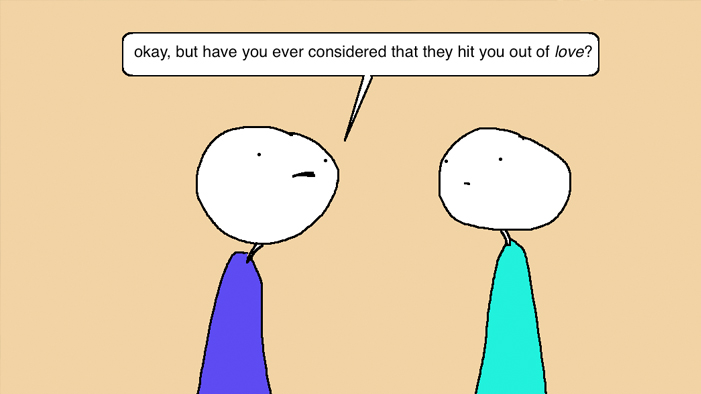Auntie SparkNotes: What’s the Difference Between Discipline and Abuse?

Dear Auntie,
So here’s a question that has confused me for a while: how do people define emotional, mental, and verbal abuse? Physical and sexual abuse are easier to spot because they’re caused by tangible and objective events like hitting or molestation, but the other three are not.
The reason I ask is because a close friend of mine started seeing the school counselor a lot before summer, and he confided in me that it was because his mom was treating him poorly at home. I’m really sad for him, but I’m also confused by the examples he gave me of what his mom did to him: she always yelled at him; she would refuse to acknowledge him for two weeks straight; she’d break his phone on purpose as punishment for watching porn; she’d call him “stupid” if he made a mistake. He was never hit or inappropriately touched, but he said that he couldn’t stand going home.
I support my friend, but I’m confused. Don’t all parents yell at their kids at some point, to discipline them? And maybe this is because I live in a religious home, but wouldn’t being caught with porn warrant a harsh punishment? If there are no bruises or other visible evidence for the abuse, how do I not know if anything in the story I hear is a misinterpretation of events?
Because of the subjective nature that emotional, mental, and verbal abuse have, I don’t see how people are able to pinpoint it. Where is the line between abuse and mundane things like disagreements and discipline? What is the basis of emotional, mental, and verbal abuse aside from “this hurts my feelings”?
Well, there’s an interesting point! Because indeed, Auntie SparkNotes would imagine that the whole concept of emotional abuse must be hard to understand if you don’t see anything wrong with hurting someone’s feelings systematically, repeatedly, and on purpose.
But, uh, you should see something wrong with that. That is objectively a wrong thing to do! And it becomes even wrong-er when you factor in the kind of power imbalance that’s inherent to a relationship between a parent and a kid. The thing that makes your friend’s mom abusive is the way she abuses her power, using it to hurt and control the son who she’s supposed to be caring for. It’s bad enough to yell at someone constantly, to give them the silent treatment, or to destroy their belongings—and surely you realize that all of these are crappy things to do to someone. But to do it to someone who can’t leave, and can’t push back? Who is legally obligated to defer to you? That’s monstrous.
All of which is to say, decent parents recognize that they wield an enormous amount of power over their children, and they’re careful about how they use it. And to be honest, some of the question you’ve asked me here make me as concerned about what you seem to view as normal parenting behavior as I am concerned about your friend’s well-being. No, sweet pea: not all parents yell at their kids, or call them names, or withhold affection to the point of refusing to acknowledge their existence for weeks on end. Most parents understand, correctly, that these are cruel and manipulative and, yes, abusive ways to treat a child.
And while discipline is a thing and a necessary aspect of parenting, decent parents do not punish their kids by breaking things—and once a kid is approaching adulthood, decent parents really don’t punish, period. Especially not when it comes to normal exploratory teenage behaviors (e.g. watching porn) that don’t cause any harm, aren’t against any laws, and are entirely none of their business. Discipline is meant to teach consequences to younger kids so that they can make good decisions down the road, not to extort obedience from older ones when they make decisions you don’t approve of—and if the latter way is how you’re using it, as a parent, you’re doing a bad thing.
With all that said, I also must say this: You say you support your friend, but that doesn’t come through in your letter. Actually, you don’t sound supportive at all; you sound skeptical to the point of contempt. (“Sure, he says his mom calls him names and gives him the silent treatment—but couldn’t he be misinterpreting? Maybe she meant ‘stupid’ in a fun way!”) Which is why I hope the above paragraphs help you understand that abuse is about wounding someone intentionally, whether it’s physical or emotional—but if they don’t, and you remain un-swayed by your friend’s pain, I also hope you’ll at least be kind enough not to be quite so obvious about it.
Got something to say? Tell us in the comments! And to get advice from Auntie, email her at advice@sparknotes.com.
Want more info about how this column works? Check out the Auntie SparkNotes FAQ.












